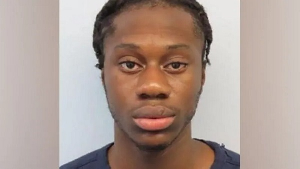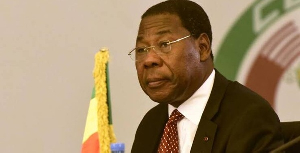The issue of public funding of political parties agitated the minds of Members of Parliament on Wednesday, during the second reading of the Political Parties Bill.
The Minority Group supported public funding of political parties as a means of strengthening them in their quest to sustain the democratic process and ensure good governance.
Most of the members on the Majority side, on the other hand, said there was the need for a national debate on the issue first before any such consideration.
A few members of the Majority, however, called for a total rejection of the idea of public funding of political parties.
Dr Obed Asamoah, Attorney General and Minister of Justice, in a motion for a second reading of the bill said the proposal for public funding of political parties is greatly problematic and requires further study.
He noted, however, that alongside the proposal is a suggestion that such fund be open to contributions from non-governmental organisations and other donors.
He was of the view that even if the public wants state funding of political parties, there would be endless arguments as to the criteria for sharing the fund, saying, "if popular support is to be the yardstick, there can be no consensus on how this is to be measured".
Dr Asamoah raised a number of questions as to how public funding of parties should be handled. He questioned, for instance, whether the sharing of the fund should be assessed on the basis of the total votes cast for each party at an election or decided on representation in Parliament.
He said if it is the former, is it the vote cast for the presidential candidates that are to be considered or those for parliamentary candidates?
"For these and other reasons, the idea of public funding of political parties, "is a political minefield where even angels fear to tread."
Dr Asamoah told the House that the Political Party Bill seeks to re-enact with new provisions, the existing Political Parties Law, 1992 (PNDCL 281), as amended.
He said the bill brings the existing enactment in conformity with the Constitution and removes some provisions in the law no longer considered purposeful, adding that it also introduces some reform for the better regulation of political party activities in the country.
The Attorney General said under the bill, merged political parties lose their individual identities upon becoming merged, while the existing provisions on proscribed political parties are not restated.
Other changes introduced by the bill are that political parties in alliance retain their separate registration as individual entities and are dealt with by the Electoral Commission as such, while there is an upward revision of fines and penalties for contravention of the various punishable provisions.
Dr Asamoah explained that due to limitation of national finances, not all the recommendations could be accepted by the government and made particular mention of the public funding of political parties.
He drew the House's attention that one fundamental policy underlying the political parties law in the country is the exclusion of foreign funding of political parties, quoting Article 55 (15) of the Constitution.
The provision says, "Only a citizen of Ghana may make a contribution or donation to a political party registered in Ghana".
The Minister said this is to eliminate foreign control or influence of the political process. "This principle is of almost universal application. I do not know of any country that allows foreign funding of political parties.
"I am not sure that the general public appreciates this and wants it or agrees that in spite of the difficulties facing the country, this should be one of our priorities".
Presenting its report on the bill, the Committee on Constitutional, Legal and Parliamentary Affairs, said the government does not reject the principle of state funding of political parties. The government, the Committee explained, did not accept public funding of political parties due to limitation of national resources
The Committee said the way out of this is the suggestion that a central or common fund be created by the direct contribution of individuals, non-governmental organisations, groups and business concerns.
"This could then be a source of funding political party activities on a formula to be approved by Parliament".
The report said the Committee saw the suggestion as being laudable but found it difficult to accept it because of the limitation in the research into the whole concept of public funding of political activity in Ghana.
The Committee, therefore, recommended that the Electoral Commission, National Commission on Civic Education (NCCE) and the Inter Party Consultative Committee be mandated by Parliament to sensitise and create public awareness of the need for state funding of political party activity in the country.
Contributing to a debate on the motion, Nana Akufo Addo, the Minority Spokesman on Constitutional and Legal Affairs, said popular demand, including 'polite' pressure from the parties, has led to the proposed reform of the law regulating the formation and operation of political parties. Nana Akufo Addo said that in contrast the dictatorial conditions under which the present PNDC Law 281 was produced, the proposed statute should reflect and advance the fundamental objectives of the Constitution.
He said the Constitution aims at the construction of a vibrant democracy, governed according to the rule of law in which human rights are enjoyed to their fullest.
The ranking Minority member saw the bill as basically flawed, which ideally should be scrapped and a new one brought in, more in tune with the spirit and objectives of the Constitution.
"Such a development in the present context is unlikely. It is thus more profitable to suggest ways of improving the proposed bill".
He suggested the injection of libertarian, right-centred culture of the Constitution into the bill, removing or weakening the 'authoritarian tendencies'.
Nana Akufo Addo said the 'excessive', 'illegitimate' exploitation of the incumbency by ruling parties is potentially the greatest single threat to the survival of multi-party democracy in Africa. He said by the current arrangement, the ruling party has unlimited access to state resources while the opposition parties could not even rely on private funding.
This he said is designed to "perpetuate and fix in concrete, the uneven playing field, which has been such a prominent feature of the 'democracy' and politics of the Fourth Republic". He said "to provide state funding of political parties, the case for, is irresistible".
Dr Kofi Konadu Apraku, the Minority Spokesman on Finance, said the bill as it stands now, is to preserve the 'status quo' and the privileges that the incumbency enjoys.
He said providing public funding for political parties would give them the opportunity to better organise and compete fairly to help strengthen the democratic process.
Mr. Kwame Osei-Prempeh, NPP-Nsuta Kwamang, said under the Directive Principles of State Policy, the government is enjoined to ensure that democracy thrives in the country.
He was of the view that this could best be achieved if political parties were funded by the state to enable them to effectively play their role in promoting democratic governance.
Squadron Leader Clend Sowu, NDC -Anlo, said the bill is good and seeks to correct some of the flaws in the PNDC Law on political parties (PNDCL 281).
He questioned how the political parties could be funded by the state when workers complain of law incomes and people do not want any more taxes.
Dr Kwabena Adjei, Leader of the House, mentioned some of the implications in public funding of political parties and said such an action would lead to proliferation of political parties, which could destabilise the country.
He noted that taxation has inflicted hardships on Ghanaians and wondered whether the people are now prepared to accept more taxes to fund political parties.
The Leader of the House said Ghana is a developing country, which can ill-afford to fund political party activity and called for the rejection of any such proposal.
Mr. C.O. Nyanor, NPP-Upper Denkyira, said the ruling NDC wants to exploit its incumbency to the maximum and would, as such, not do anything that would threaten its advantage.
Ms Christine Churcher, NPP-Cape Coast, noted that if there is any reform in the bill it is a reform to make the opposition parties so disadvantaged that the ruling NDC would continue to stay in power.
Mr. Alban Bagbin, Chairman of the Committee on Constitutional, Legal and Parliamentary Affairs and Member for Nadowli North, said there is no where in either the report or the memorandum accompanying the bill that the proposal for state funding of political parties has been rejected. He said in principle, the issue of public funding of political parties is acceptable to the government, but the difficulty is the implementation.
He suggested that the issue should be subjected to more public involvement. Mr. Freddie Blay, Second Deputy Speaker and Member for Ellembelle, said the bill seeks to broaden the frontiers of democracy and this can be further enhanced if political party activities are funded from state coffers.
Nii Okaija Adamafio, Minister of the Interior and Member for Odododiodioo, said if other countries by historical or cultural considerations are supporting such a scheme, Ghana cannot afford it.
He said the idea of public funding of political parties should, therefore, be rejected. Mr. S. K. Boafo the Minority Chief Whip said the Majority side has something to hide that is why it does not want to support state funding of political parties.
Dr Alex Ababio, NDC-South Dayi, said the time is not ripe for Parliament to approve public funding of the political parties, saying, "it will be ridiculous to do so now when the country is going round, cup in hand looking for money".
The debate continues
General News of Friday, 3 December 1999
Source: null












